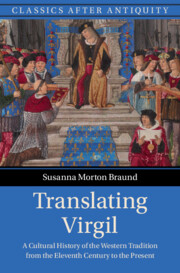 Translating Virgil
Translating Virgil Published online by Cambridge University Press: 15 May 2025
I argue that the most efficacious way of establishing a national literature was through the translation of major, high-prestige, foreign texts, such as Greco-Roman epic poetry: translation of Virgil’s poems has had a significant role in creating and honing literary language in European vernaculars and has sometimes served proto-nationalistic and nationalistic agendas. After analysis of the scope of ‘nationalism’ and its relevance to Virgil, I examine examples of the appropriation of cultural authority through translation of the Aeneid in French translations from the sixteenth century, then in other languages including Russian, Hungarian, Portuguese (in both Portugal and Brazil), Catalan, Katharevousa Greek, Maltese and Welsh, with special discussion of the foundational work of Ukrainian literature. I then discuss cases of translation as a proto-nationalist phenomenon, in Hebrew and Argentinian Spanish, and as a transnational phenomenon, in Esperanto. I conclude by relating translation and nation in both outward-looking and inward-looking modalities and in vertical and horizontal dimensions.
To save this book to your Kindle, first ensure no-reply@cambridge.org is added to your Approved Personal Document E-mail List under your Personal Document Settings on the Manage Your Content and Devices page of your Amazon account. Then enter the ‘name’ part of your Kindle email address below. Find out more about saving to your Kindle.
Note you can select to save to either the @free.kindle.com or @kindle.com variations. ‘@free.kindle.com’ emails are free but can only be saved to your device when it is connected to wi-fi. ‘@kindle.com’ emails can be delivered even when you are not connected to wi-fi, but note that service fees apply.
Find out more about the Kindle Personal Document Service.
To save content items to your account, please confirm that you agree to abide by our usage policies. If this is the first time you use this feature, you will be asked to authorise Cambridge Core to connect with your account. Find out more about saving content to Dropbox.
To save content items to your account, please confirm that you agree to abide by our usage policies. If this is the first time you use this feature, you will be asked to authorise Cambridge Core to connect with your account. Find out more about saving content to Google Drive.